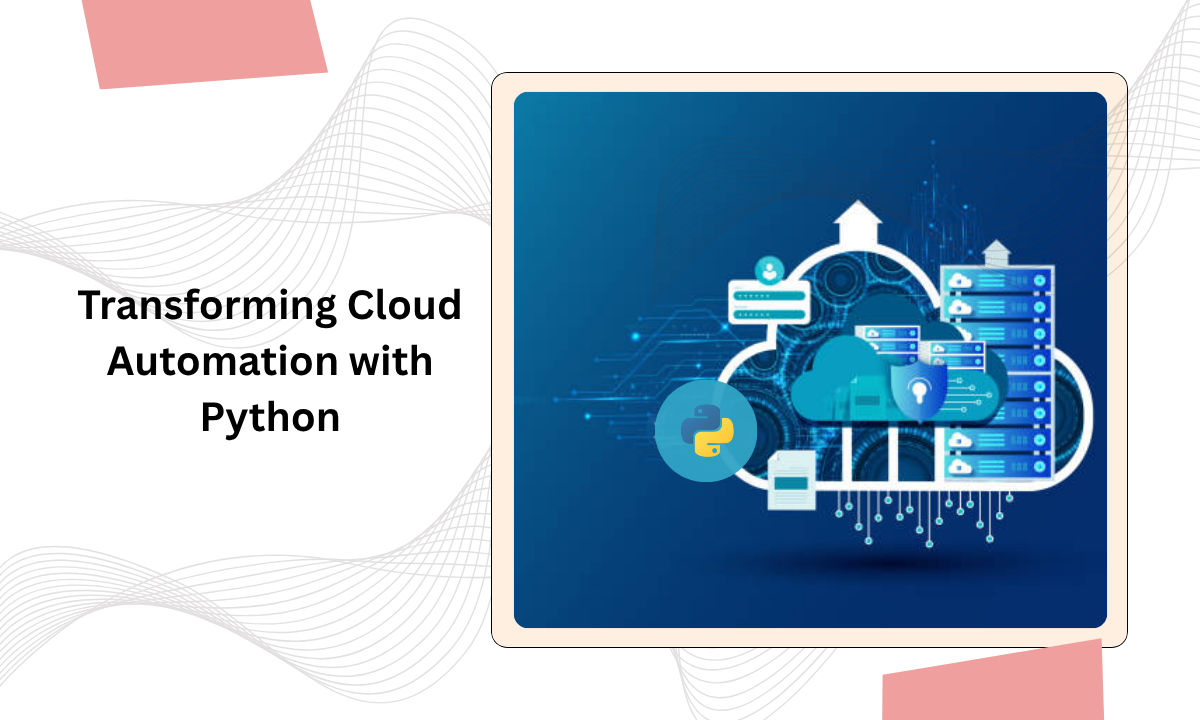Table of contents:
|
1. What Is Cloud Automation? |
|
2. Why Python Is the Language of Choice for Cloud Automation |
|
3. Key Applications of Python in Cloud Automation |
|
4. Cloud Infrastructure Automation |
|
5. Cloud Integration Automation |
|
6. Cloud Migration Automation |
|
7. Automated Cloud Backup |
|
8. Monitoring and Security |
|
9. How a Python Course in Bangalore Can Help You Build Cloud Automation Skills |
|
10. Python’s Role in Multi-Cloud Environments |
|
11. Future of Cloud Automation with Python |
|
12. Tip for Learners |
|
13. Final Thoughts |
|
14. FAQs |
When discussing cloud automation, one programming language consistently stands out: Python. In today’s fast-paced digital era, automation is no longer a luxury; it’s a necessity. From managing servers to deploying applications, cloud platforms rely heavily on automation tools, and Python has become the backbone of this transformation.
As professionals or aspiring tech learners, understanding Python in cloud computing is one of the smartest career moves you can make right now. And if you are just starting, a structured Python course in Bangalore can be your first step into this exciting world.
So, how exactly does Python simplify cloud automation and make businesses more efficient? Let’s explore.
What Is Cloud Automation?

Cloud automation refers to the use of software and scripts to automate the management of cloud-based tasks, such as deploying virtual machines, setting up storage, monitoring resources, or scaling applications.
Instead of manually configuring each service, automation tools execute these operations using predefined rules or code.
It saves time, reduces human error, and ensures consistency across multiple cloud environments.
Why Python Is the Language of Choice for Cloud Automation
Python has quickly become the go-to language for automating cloud operations.
Here’s why:
-
Ease of use: Its simple syntax makes scripting and configuration fast.
-
Strong library support: Modules like boto3, fabric, and paramiko simplify automation across AWS, Azure, and Google Cloud.
-
Cross-platform compatibility: Python scripts run seamlessly on different operating systems and cloud platforms.
-
Community and integration: Python easily integrates with DevOps, APIs, and AI-based monitoring tools.
In short, Python and cloud work hand in hand, enabling faster, smarter, and more scalable automation.
Key Applications of Python in Cloud Automation
Here are the major areas where Python is revolutionizing cloud operations:
|
Cloud Automation Area |
How Python Helps |
Common Tools & Libraries |
|
Cloud Infrastructure Automation |
Provisioning virtual machines, configuring networks, and managing resources automatically |
Boto3, Ansible, Terraform, AWS SDK |
|
Cloud Integration Automation |
Connecting multiple cloud services through APIs |
Flask, REST APIs, JSON, Requests |
|
Cloud Migration Automation |
Streamlining data and application movement between platforms |
Fabric, Cloud SDKs, Pandas for data handling |
|
Automated Cloud Backup |
Scheduling and verifying cloud backups |
Cron jobs, Boto3, OS libraries |
|
Security and Monitoring |
Detecting threats and analyzing logs in real time |
AWS CloudWatch, Python logging modules |
Each of these functions reduces manual effort and makes the IT infrastructure more intelligent and resilient.
Cloud Infrastructure Automation
One of the biggest challenges in cloud operations is managing infrastructure, from provisioning servers to configuring networks.
Using Python scripts, we can define and deploy infrastructure automatically with tools like Ansible and Terraform.
Example:
A few lines of Python code using the boto3 library can create and configure an EC2 instance on AWS in seconds.
This type of cloud infrastructure automation minimizes human intervention and ensures faster deployments.
Cloud Integration Automation
Most companies today use multiple cloud platforms or hybrid environments. Integrating services like AWS, Azure, and Google Cloud can be complex, but Python makes this process seamless.
Python’s API handling capabilities allow easy data exchange between cloud platforms.
Libraries like Flask and Requests help create lightweight automation services for integration tasks.
Example:
Automatically syncing user data between AWS S3 and Google Cloud Storage through an API-based Python script.
Cloud Migration Automation
Moving data or applications from one cloud to another can be tedious. But with Python, cloud migration automation becomes faster and less error-prone.
Python scripts can monitor transfer progress, handle exceptions, and even optimize performance during migration.
Tip:
When migrating, always use log tracking to identify bottlenecks. Python’s built-in logging library can help you monitor each stage.
Automated Cloud Backup
Backups are crucial for every business. Python makes it simple to create automated cloud backup systems that run on schedules.
By using cron jobs and automation scripts, we can automatically upload or sync data to cloud storage.
Example:
A Python script that backs up databases every night to AWS S3 ensures data safety without manual checks.
This not only improves reliability but also helps meet compliance requirements.
Monitoring and Security
Security is a major part of cloud-based automation. Python’s compatibility with monitoring tools like AWS CloudWatch and Azure Monitor makes it a great fit for automating alerts and threat detection.
Example:
You can write a Python function that triggers an email or Slack notification when CPU usage exceeds a threshold.
With this proactive automation, issues can be identified and resolved before they affect operations.
How a Python Course in Bangalore Can Help You Build Cloud Automation Skills
If you want to enter the cloud or DevOps fields, Python is an essential skill.
A structured Python Course in Bangalore can help you:
-
Learn to use Python for real-world cloud automation projects
-
Understand integration between AWS, Azure, and Google Cloud
-
Build scripts for deployment, migration, and monitoring
-
Get hands-on experience with tools like Ansible and Terraform
-
Prepare for job roles like Cloud Engineer, DevOps Engineer, or Automation Specialist
At our reputed training institute in Bangalore, you will learn by doing, building your own automation pipelines, managing infrastructure, and monitoring systems efficiently.
Python’s Role in Multi-Cloud Environments
As companies adopt multi-cloud and hybrid architectures, Python becomes even more powerful.
Because of its platform-agnostic nature, Python scripts can control workloads across AWS, Azure, and Google Cloud simultaneously.
This allows organizations to avoid vendor lock-in and gain flexibility in deployment.
Future of Cloud Automation with Python
The next few years will bring even deeper integration of Python with AI-driven automation.
Predictive scaling, self-healing cloud infrastructure, and auto-optimization are already becoming standard.
Python’s simplicity ensures that professionals can build, test, and deploy these advanced automation systems without needing complex programming languages.
Tip for Learners
Start small; automate one cloud task at a time. For instance, begin with an automated cloud backup project before moving to infrastructure-level automation. This helps you build confidence gradually.
Final Thoughts
As cloud technology continues to grow, cloud automation is becoming one of the most in-demand skills in the IT world.
Python’s flexibility, readability, and massive community support make it the ultimate choice for automating cloud environments.
If you are ready to explore this career path, joining a Python course in Bangalore is the perfect place to start.
At Apponix, we provide in-depth, hands-on training that helps learners build automation workflows, integrate multi-cloud systems, and master Python scripting, making you job-ready for the future of cloud computing.
FAQs
Q1: What is cloud automation?
It is the process of using software and scripts to manage, configure, and operate cloud services automatically, reducing manual effort and increasing efficiency.
Q2: Why is Python popular for cloud automation?
Python’s simple syntax, strong library support, and easy integration with cloud APIs make it ideal for automating cloud-based tasks and workflows.
Q3: Which tools are best for Python-based cloud automation?
Popular tools include Ansible, Boto3, Terraform, and AWS SDKs, all of which use Python for automating deployments, backups, and monitoring.
Q4: Can Python be used for cloud migration?
Yes. Python scripts can automate data transfer, application setup, and monitoring during migration between different cloud platforms.
Q5: How can I start learning Python for cloud automation?
Enroll in a Python course in Bangalore, where you will gain hands-on experience with Python scripting, cloud APIs, and automation frameworks.




